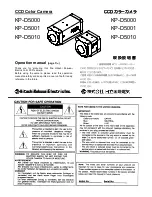
435
Technical Notes
D
Notes on Optional Flash Units
Refer to the flash unit manual for detailed instructions. If the unit
supports CLS, refer to the section on CLS-compatible digital SLR
cameras. Note that this camera is not included in the “digital SLR”
category in the SB-80DX, SB-28DX, and SB-50DX manuals.
i-TTL flash control can be used at ISO sensitivities between 100 and
12800. At values over 12800, the desired results may not be achieved
at some ranges or aperture settings. If the flash-ready indicator (
c
)
flashes for about three seconds after a photograph is taken in i-TTL or
non-TTL auto mode, the flash has fired at full power and the
photograph may be underexposed (CLS-compatible flash units only).
When an SC-series 17, 28, or 29 sync cable is used for off-camera flash
photography, correct exposure may not be achieved in i-TTL mode. We
recommend that you select standard i-TTL fill-flash. Take a test shot
and view the results in the camera display.
In i-TTL, use the flash panel or bounce adapter provided with the flash
unit. Do not use other panels such as diffusion panels, as this may
produce incorrect exposure.
In mode
P
, the maximum aperture (minimum f-number) is limited
according to ISO sensitivity, as shown below:
Maximum aperture at ISO equivalent of:
100
200
400
800
1600
3200
6400
12800
4
5
5.6
7.1
8
10
11
13
If the maximum aperture of the lens is smaller than given above, the
maximum value for aperture will be the maximum aperture of the lens.
AF-assist illumination is provided by the camera, not the flash unit; the
SB-5000, SB-910, SB-900, SB-800, SB-700, SB-600, SB-500, and SB-400
do, however, provide red-eye reduction.
Noise in the form of lines may appear in flash photographs taken with
an SD-9 or SD-8A high-performance battery pack attached directly to
the camera. Reduce ISO sensitivity or increase the distance between
the camera and the power pack.
Summary of Contents for Z50
Page 525: ......
















































